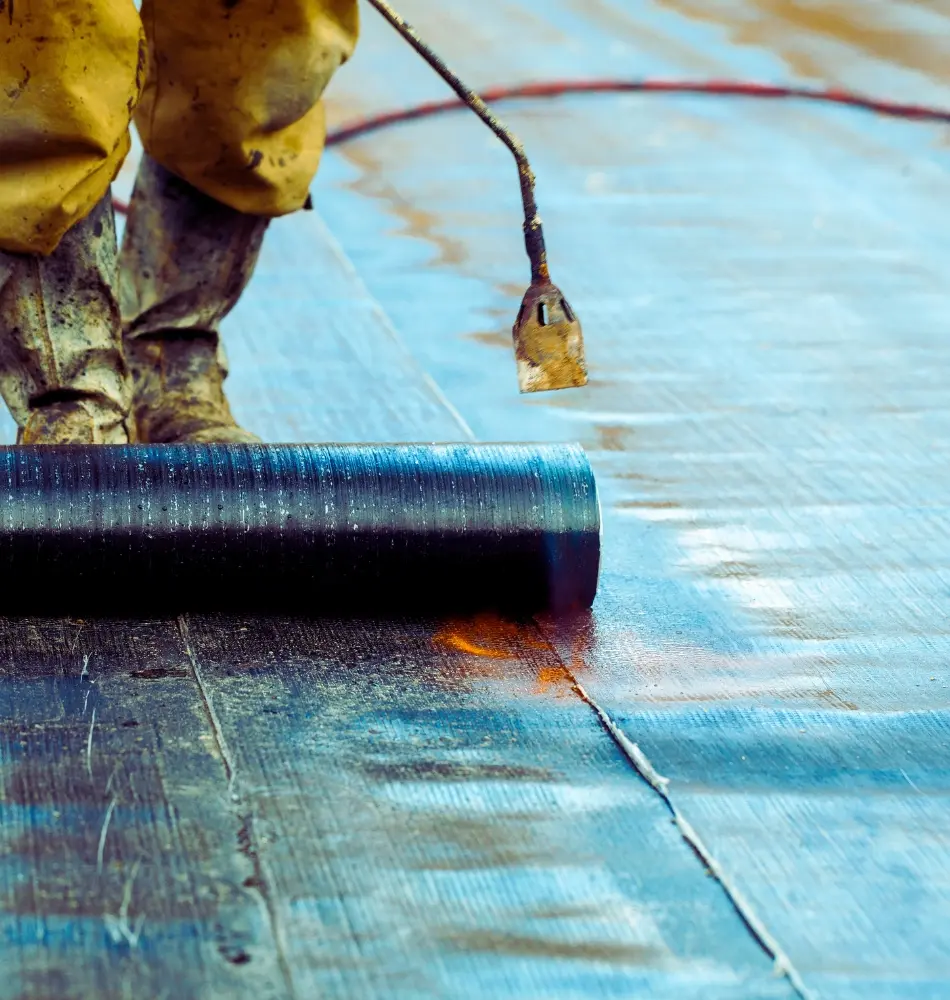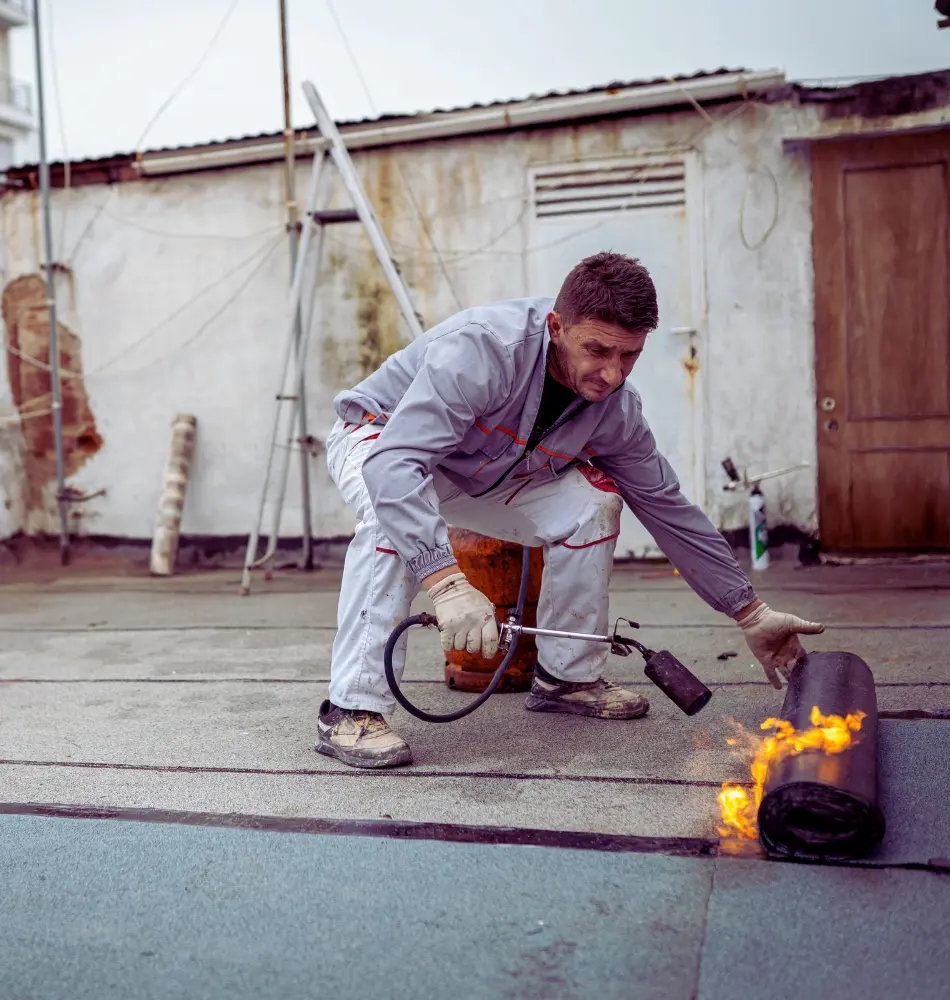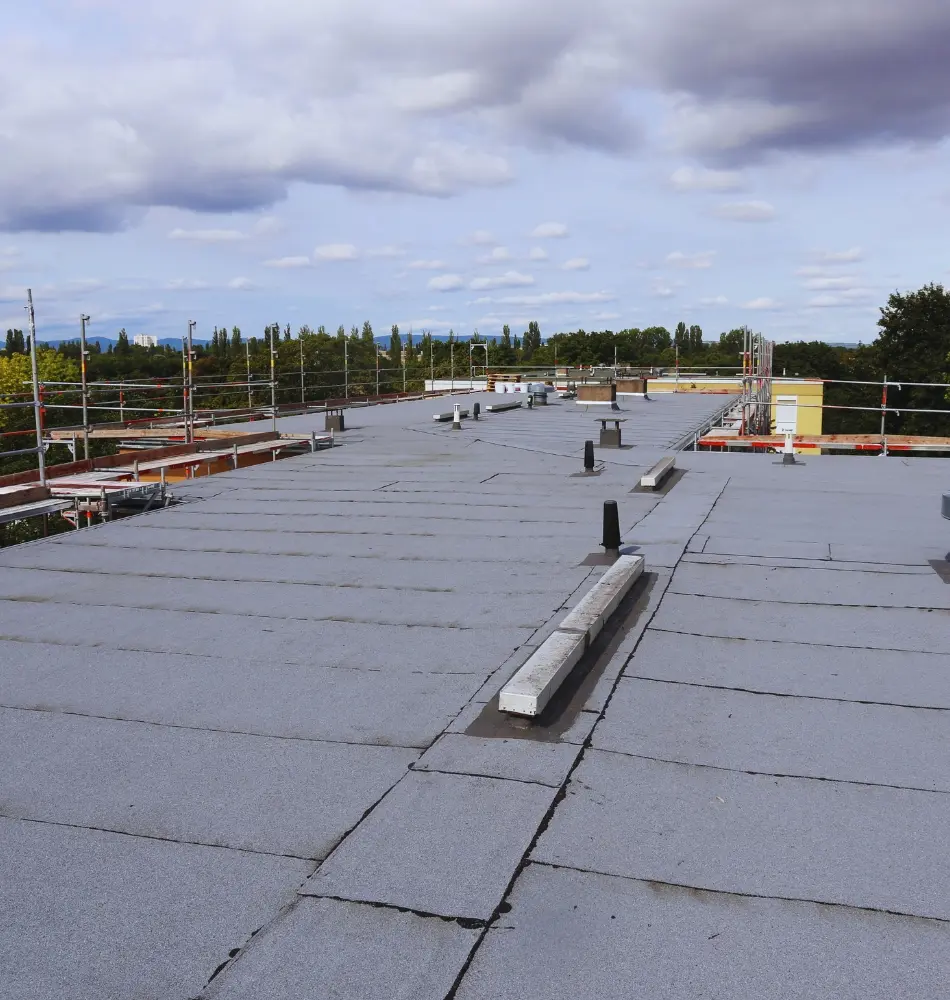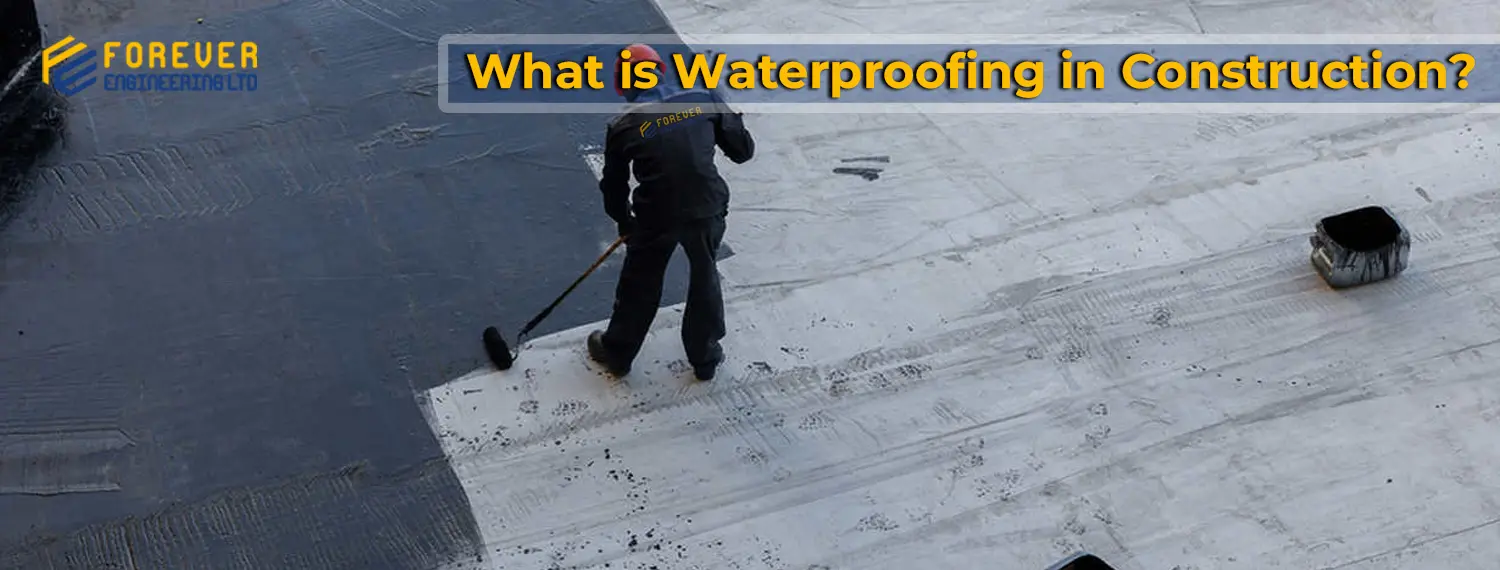Waterproofing materials and processes have developed greatly in the always-changing sector of building. It provides strong solutions to preserve the integrity and safety of structures. Anyone working in the construction industry has to understand the significance and techniques of waterproofing. Because it is essential to maintaining the buildings’ long-term usability and aesthetic appeal.
This is why today we are going to explore What is waterproofing in construction.
What is Waterproofing in Construction
Table of Contents
Toggle
Waterproofing is a method used to prevent water from entering a building structure. Usually, layers and stages of waterproofing are used to create multiple barriers that keep water out of the building. A structure can be made waterproof with membranes and coatings, which also protect the building’s internal and external contents.
Basements, walls, restrooms, kitchens, terraces, balconies, decks, green roofs, water tanks, swimming pools, etc. all require waterproofing.
To put it briefly, waterproofing stops water from seeping into internal and external building components such as walls, ceilings, water tanks, toilets, and swimming pools. By acting as a barrier to keep water from passing through the material, waterproofing helps keep buildings dry and free from flooding.
By lowering the internal humidity, waterproofing shields our interiors from the damaging effects of moisture and water.
Importance of Waterproofing in Construction
Waterproofing the house is critical for preserving the building’s structural integrity. The following are some major reasons why waterproofing is important:
- Waterproofing aids in preventing seepage through your home’s walls. It will also support a healthy, robust start for your recently built building and assist prevent water damage.
- When moisture enters the house, it becomes damp on the walls and ceilings, which encourages the growth of mildew and mold. This generates spores, which again lead to a number of health problems. Getting your home waterproofed is always a good idea to shield you and your family from unanticipated health problems.
- You may find waterproofing your home intimidating since it seems like it will break your finances. Still, it is best to think of it as a long-term financial commitment that pays for itself throughout the course of the building.
- It has been discovered that waterproofing aids in the early sealing of a newly constructed site, hence promoting long-term comfort. The actions are taken in an effort to reduce the quantity of moisture present in the structure.
Types of Waterproofing in Building Construction

The process of waterproofing involves keeping vapor and water out of the structure. It aids in repairing the structural fissure. As a result, selecting the best waterproofing method requires a lot of effort. The following is a list of several types of waterproofing:
Cementitious Waterproofing
The most readily available waterproofing materials are often cementitious compounds. They are easy to mix and apply, and vendors of masonry products have them readily available.
Because cementitious waterproofing solutions are typically semi-flexible or rigid, they are utilized indoors in areas like restrooms and other locations protected from the elements. Numerous concrete applications can benefit from this type of waterproofing.
Polyurethane Waterproofing
Polyurethane is composed of two components: the base and the reactor. For waterproofing applications, both provide a liquid coating when combined in a particular design ratio.
Because it is so simple to install, polyurethane is a pretty popular option. Compared to sheet membranes and liquid-applied membranes, which are other waterproofing solutions, this polyurethane application requires a great deal less expertise and supervision.
This waterproofing solution works well for post-construction applications and is easy to apply. Since polyurethane is extremely sensitive to moisture content, it is important to assess the moisture content before applying polyurethane to prevent membrane peeling or de-bonding.
Bituminous Membrane Waterproofing
Waterproofing is accomplished with bituminous coating, a flexible protective layer. It is an excellent protective and waterproofing coating, particularly for concrete foundations and other similar surfaces.
The mixture is usually made up of organic liquids that are sticky. They are also ferociously and permanently waterproof. Because of this, the content is quite beneficial for this specific use. When building a roof, bituminous membrane waterproofing is commonly utilized.
Liquid Rubber Waterproofing
Applied with a primer and topcoat using a trowel, roller, or spray, a liquid membrane offers greater flexibility than cementitious waterproofing. The kind of manufacturer determines the liquid’s surface elongation properties, and the liquid is often cured in a rubber coating on the wall.
PVC Waterproofing
This polyvinyl chloride roofing material is widely used. Its primary use is in roof waterproofing. The base of this kind of waterproofing material will be strengthened. The base is usually made of glass fiber or polyester mesh.
Although roofing accounts for the majority of its uses, swimming pools, tunnels, and subterranean constructions are other common places for its use.
Advantages of Waterproofing
The advantages of waterproofing are as follows:
- Waterproofing keeps the concrete floor from cracking and helps to minimize water absorption.
- Waterproofing keeps reinforcement from corroding and extends the life of sturdy structure.
- It also stops seepage from the walls and ceiling and defends against moisture entering the building structure.
- Waterproofing is simple to apply and lowers a building’s upkeep costs.
- A well-designed waterproofing system offers a clean, healthy living space.
- Waterproofing protects the occupants of the building as well as the structure itself.
Disadvantages of Waterproofing
The disadvantages of waterproofing are as follows:
- Bitumen-based products deteriorate in the summer heat because the black color has a limited shelf life because of solvent evaporation.
- The polyurethane protecting layer shouldn’t be very flexible.
- Concrete cannot naturally breathe due to the polyurethane protective covering.
- There is a limited pot life for polyurethane protective coatings, and water can collect under impermeable floor coatings.
- Further leakage in cementation waterproofing results from the incapacity to control the fractures.
Waterproofing Applications

Waterproofing is applied in various parts of construction projects, including:
Foundations: By shielding the foundation from groundwater, possible collapse and structural deterioration are avoided.
Basements: keeps basements dry and functional while stopping the growth of mold and water damage.
Roofs: In order to stop leaks and increase the building’s lifespan, waterproofing the roof is essential.
Bathrooms and Kitchens: Since these regions are regularly in contact with water, waterproofing is crucial to avoiding leaks and other damage.
Balconies and Terraces: To prevent water damage to the underlying structure, these outdoor spaces require waterproofing.
Forever Engineering LTD’s Role in Waterproofing in Construction
Forever Engineering is the leading construction company in Bangladesh. At Forever Engineering LTD, we pride ourselves on being leaders in the field of waterproofing in construction.
Our expertise and dedication ensure that every project we undertake is protected from the potentially devastating effects of water infiltration. Our comprehensive approach to waterproofing encompasses a wide range of techniques and solutions, tailored to meet the specific needs of each client and project.
Our waterproofing materials are designed to withstand hard weather for an extended period of time. When it comes to successfully sealing off existing fractures to stop water seepage, our materials are the best. Our staff of highly skilled experts has years of experience in this field and handles every step of the waterproofing procedure.
All you need to do is get in contact with Forever Engineering right now if you’re looking for cost-effective, premium building services. You can reach us at any time to learn more about our offerings or to obtain a free estimate.
Final Words
Finally, you have learned what is waterproofing in construction. Whether you’re building a new home or renovating an existing one, waterproofing is essential as it will preserve its appearance and raise its market worth.
Forever Engineering is a reliable partner for any building project because of our proficiency in foundation protection, basement waterproofing, roof waterproofing, balcony and terrace waterproofing, and interior waterproofing for wet areas. We guarantee that constructions continue to be secure, long-lasting, and resilient in the face of obstacles caused by water infiltration by our commitment to quality and innovation.
Frequently Asked Questions
Where is waterproofing used?
The basement, walls, restrooms, kitchen, terraces, balconies, decks, green roofs, water tanks, swimming pools, etc. all require waterproofing.
What are the applications of cementitious waterproofing?
1. Water treatment plants
2. Sewage treatment facilities
3. Bridges
4. Dams
5. Railway and subway systems
6. Marine cargo ports and docks
7. River locks/channels
8. Parking structures
9. Tunnels
What materials are commonly used in waterproofing?
Bitumen, polyurethane, EPDM rubber, cementitious materials, and specialty liquid membranes are common materials used for waterproofing. Every material has unique qualities and is selected according to the area that needs to be waterproofed as well as the necessary flexibility and durability.
How long does waterproofing last?
The materials utilized, the caliber of the application, and the surrounding circumstances all affect how long waterproofing lasts. Waterproofing typically has a lifespan of five to twenty years. Its efficacy can be increased with routine maintenance and inspections.
How much does waterproofing typically cost?
The extent of the area that needs to be treated, the building’s condition, and the method used all affect how much waterproofing costs. The price might range from a few hundred to several thousand dollars on average. For an exact estimate, it is best to have a professional assessment and quote.

